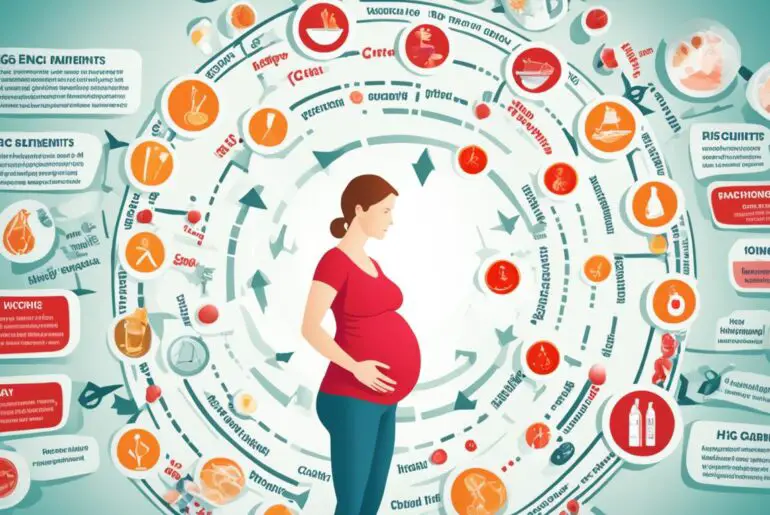Did you know that the HCG diet, a controversial weight loss method, can have implications for fertility? The use of HCG hormone injections or supplements as part of this diet can affect a woman’s reproductive health in unexpected ways. Understanding the potential impact of the HCG diet on fertility is crucial, especially for those planning to start a family.
Key Takeaways:
- The HCG diet, involving the consumption of 500 calories per day and the use of HCG hormone, has a controversial reputation.
- HCG hormone injections or supplements are approved for treating fertility issues but not for weight loss by the FDA.
- The HCG hormone stimulates egg production in the ovaries, which can have an impact on fertility.
- It is important to discontinue the HCG diet once pregnancy occurs to avoid any potential adverse effects.
- Seeking guidance from healthcare professionals is crucial when considering weight loss methods and planning for pregnancy.
Understanding the HCG Diet
The HCG diet is a weight loss method that involves severely restricting calorie intake to around 500 calories per day. This low-calorie diet is combined with the use of hCG hormone injections or supplements.
The hCG hormone, naturally produced during pregnancy, is also approved by the FDA for treating fertility issues. However, it is important to note that the FDA does not endorse the use of hCG for weight loss purposes.
The effectiveness and safety of the HCG diet have been a subject of debate. While some individuals claim to have successfully lost weight with this method, others question its long-term sustainability and potential risks.
It is important to consider the potential impact on fertility when following the HCG diet. The hCG hormone plays a role in stimulating egg production in women, which can have implications for those trying to conceive. However, once pregnancy occurs, it is advised to discontinue the HCG diet to avoid any potential adverse effects.
Key Points:
- The HCG diet involves severe calorie restriction, typically around 500 calories per day.
- It includes the use of hCG hormone injections or supplements.
- The hCG hormone is approved for treating fertility issues but not for weight loss by the FDA.
- The diet’s effectiveness and safety are subjects of debate.
- It is crucial to consider the potential impact on fertility when following the HCG diet.
| Pros | Cons |
|---|---|
| Some individuals report successful weight loss. | The FDA does not endorse the use of hCG for weight loss. |
| The hCG hormone may stimulate egg production in women. | Severely restricted calorie intake may not provide sufficient nutrients. |
| May lead to temporary weight loss. | Potential risks and side effects. |
Impact on Fertility

The hCG hormone used in the HCG diet has a significant impact on fertility, particularly in women. This hormone stimulates egg production in the ovaries, increasing the chances of getting pregnant. The hCG hormone, which is naturally produced during pregnancy, plays a crucial role in the development of the embryo.
However, it is important to note that once pregnancy occurs, it is necessary to discontinue the HCG diet. The abundance of hCG hormones from the diet could have harmful consequences for the pregnancy. It is essential to prioritize the health and well-being of both the mother and the developing baby.
If you are planning for pregnancy, it is advisable to seek alternative weight loss methods that do not involve hCG hormone supplementation. Consult with your healthcare provider to explore safe and effective options. They can provide personalized advice based on your specific health needs and fertility goals.
Remember, maintaining a healthy weight and overall wellness is vital for fertility and successful pregnancy outcomes. It is always best to consult with a healthcare professional to ensure you are making informed decisions about your reproductive health.
HCG Diet and Pregnancy Planning
If you are considering the HCG diet and also planning for pregnancy, it is important to carefully evaluate the potential impact of this low calorie diet on your body’s nutritional needs and fertility.
The HCG diet is known for its extremely low calorie intake, typically around 500 calories per day. While this may result in rapid weight loss for some individuals, it is essential to understand that such a restricted diet may not provide sufficient calories and nutrients to properly support both your body and a developing baby during pregnancy.
When actively trying to conceive, it is crucial to prioritize your body’s nutritional needs. A healthy pregnancy requires an adequate intake of essential nutrients for the proper growth and development of the fetus. Considering a low calorie diet like the HCG diet may not meet these requirements, potentially compromising the health of both you and your future baby.
Additionally, fertility issues can arise from imbalances in nutrition and hormone levels. It is essential to seek appropriate advice from healthcare professionals when planning for pregnancy. They can guide you in choosing a diet that meets your body’s nutritional needs while also addressing any fertility concerns you may have.
Remember, while HCG treatments can be beneficial for fertility issues, it is important to prioritize your overall health and well-being when planning for pregnancy. Consulting with a healthcare professional will ensure that you make informed decisions about your fertility journey and weight loss goals.
Key Considerations:
- Ensure sufficient calorie intake to support your body’s nutritional needs during pregnancy.
- Consult with a healthcare professional to address any fertility issues and seek appropriate advice on diet and weight loss.
- Prioritize overall health and well-being when planning for pregnancy.
By taking these considerations into account, you can ensure that your journey towards pregnancy is supported by a healthy, balanced approach to nutrition and weight management.
The Importance of a Healthy Diet and Pre-Pregnancy Care
Achieving and maintaining a healthy weight range through a balanced diet is crucial for optimizing fertility and ensuring a healthy pregnancy. If you are planning for pregnancy, it is recommended to focus on consuming a variety of nutrient-dense foods that meet your body’s needs.
| Nutrients | Sources |
|---|---|
| Protein | Lean meats, poultry, fish, legumes |
| Folic Acid | Leafy greens, fruits, nuts, whole grains |
| Calcium | Dairy products, fortified plant-based milk, leafy greens, tofu |
| Iron | Red meat, fortified cereals, legumes, dried fruits |
| Omega-3 Fatty Acids | Fatty fish, flaxseeds, chia seeds, walnuts |
| Vitamin D | Sunlight exposure, fortified dairy products, fatty fish |
Following a well-rounded diet, rich in these essential nutrients, can help optimize your fertility and set the foundation for a healthy pregnancy.
Remember, pregnancy planning is a crucial time to prioritize your health and well-being. By making informed choices about your diet and seeking professional guidance, you can support your fertility, maximize your chances of a healthy pregnancy, and lay the groundwork for a positive start to your parenting journey.
Safety and Effectiveness of HCG Diet

When considering any weight-loss products, it’s important to prioritize safety and effectiveness. The safety of the HCG diet, in particular, has raised concerns, prompting an advisory from the FDA.
The FDA advises consumers to avoid over-the-counter weight-loss products that contain hCG, as they have not been proven to be safe or effective for weight loss. While the HCG diet may lead to short-term weight loss due to severe calorie restriction, it carries potential risks.
One risk associated with the HCG diet is gallstone formation. The low-calorie intake can increase the risk of developing gallstones, which can cause severe pain and might require medical intervention.
Additionally, the HCG diet’s severe calorie restriction can lead to irregular heartbeat and imbalances in electrolyte levels. These side effects can have serious implications for overall health and well-being.
Research has also suggested a potential link between hCG weight-loss products and an increased risk of cancer. Although further studies are needed to establish a definitive connection, it is essential to be aware of this potential risk.
“Consumers should be cautious about all weight-loss products on the market. If the product is marketed as homeopathic, it’s not approved by the FDA for any purpose, and it could contain unknown ingredients that have the potential to pose harm to your health.”
These risks emphasize the importance of seeking safer alternatives for weight loss. Prioritizing a balanced diet and regular exercise, under the guidance of healthcare professionals, can provide a more sustainable and healthier approach to achieving weight loss goals.
Risks of the HCG Diet:
- Gallstone formation
- Irregular heartbeat
- Electrolyte imbalances
- Potential increase in cancer risk
With these risks in mind, it is essential to make informed decisions about weight loss methods and prioritize overall health and safety.
Risks and Side Effects
The HCG diet is associated with various risks and side effects that individuals should be aware of before considering this weight loss method. These risks include:
- Fatigue: Following a very low-calorie diet can lead to feelings of fatigue and low energy levels.
- Irritability: Severely restricting calorie intake may also result in irritability and mood swings.
- Depression: The HCG diet’s extreme calorie restriction can contribute to feelings of depression and sadness.
- Fluid buildup: Some individuals may experience fluid retention, known as edema, as a result of the HCG diet.
- Blood clots: A serious concern is the potential formation of blood clots, which can block blood vessels and lead to serious health complications, including thromboembolism.
Furthermore, the HCG diet can cause breast swelling in boys and men, a condition known as gynecomastia.
These risks highlight the importance of considering safer weight loss methods that prioritize overall health and consulting healthcare professionals for guidance. It is crucial to make informed decisions about weight loss and prioritize both physical and mental well-being.
Seek Medical Advice
It is essential to consult with healthcare professionals before embarking on any weight loss program, especially a low-calorie diet like the HCG diet. Healthcare providers can assess an individual’s overall health, identify any potential risks, and offer tailored advice to ensure a safe and effective weight loss journey.
Considerations for Those Planning Pregnancy

When planning for pregnancy, several factors should be taken into consideration to ensure a healthy and successful journey. If you have been following the HCG diet or considering it, it is crucial to understand the impact it can have on your fertility and overall well-being.
One essential consideration is the dosage of hCG administered during the diet. It’s important to note that the dosage amounts used for fertility treatment are typically higher than those used for weight loss on the HCG diet. Consulting with healthcare professionals is essential to determine the appropriate hCG dosage for your specific needs, ensuring a safe approach that aligns with your fertility goals.
Additionally, maintaining a healthy weight range, as determined by your body mass index (BMI), plays a significant role in optimizing fertility outcomes. Research has shown that both obesity and being underweight can reduce fertility in both men and women. By achieving a healthy weight range within your BMI, you can improve your chances of conceiving and having a healthy pregnancy.
Seeking the guidance of healthcare professionals who specialize in fertility and reproductive health is vital during this planning phase. They can provide valuable insights, personalized advice, and assist you in creating a comprehensive pre-pregnancy plan that encompasses lifestyle modifications, nutrition, and overall well-being.
Benefits of maintaining a healthy weight range:
- Improved hormonal balance
- Enhanced ovulation and egg quality
- Increased chances of successful implantation
- Reduced risk of pregnancy complications
By taking these considerations into account, you can optimize your chances of achieving a healthy and successful pregnancy. Prioritizing your overall health, consulting with healthcare professionals, and making informed decisions will lay the foundation for your future journey into motherhood.
| Factors to Consider | Implications |
|---|---|
| HCG dosage | Determine appropriate dosage with healthcare professionals |
| Body Mass Index (BMI) | Maintain a healthy weight range to optimize fertility outcomes |
| Infertility | Consult with fertility specialists for personalized guidance |
| Healthy Weight Range | Achieve and maintain a healthy weight for improved fertility |
Pregnancy Test Results and HCG Diet
When considering the HCG diet, it’s important to be aware of how it can affect pregnancy test results. The HCG hormone used in the diet can be detected by pregnancy tests, resulting in a positive result even if the person is not actually pregnant. This is because the hormone is present in the body due to the hCG injections or supplements taken as part of the diet.
If you are planning to undergo the HCG diet in Indianapolis or any other location, it is crucial to discuss the diet with a healthcare professional who can provide guidance on the implications for pregnancy testing. They can help you understand the potential for false positive results and guide you on the best course of action.
It’s essential to have accurate and reliable pregnancy test results, especially if you are actively trying to conceive. Consulting with a healthcare professional will ensure that you have the necessary information and support to make informed decisions about your fertility journey.
Understanding False Positive Results
A false positive result occurs when a pregnancy test shows a positive result but the person is not actually pregnant. In the case of the HCG diet, the presence of the hCG hormone in the body due to the injections or supplements can cause the test to detect the hormone, leading to a positive result.
It’s important to note that false positive results can be emotionally challenging, as they may create a false sense of hope and excitement about a potential pregnancy. Seeking guidance from a healthcare professional can help manage expectations and provide clarity in such situations.
“False positive pregnancy test results can be frustrating and confusing, especially for those who are actively trying to conceive. Consulting with a healthcare professional familiar with the HCG diet can provide the necessary guidance and support during this time.”
Seeking Professional Guidance is Key
When embarking on the HCG diet, consulting with a healthcare professional is essential to fully understand the potential impact on pregnancy test results. By discussing your plans with a healthcare provider, you can gain valuable insights and personalized advice tailored to your specific situation.
Healthcare professionals can provide clarity on the dynamics between the HCG hormone and pregnancy testing, ensuring that you understand the implications and potential for false positive results. Their guidance will empower you to make informed decisions about your fertility journey and the HCG diet.
Factors to Consider for Pregnancy Testing during HCG Diet
| Factors | Considerations |
|---|---|
| HCG Diet Phase | The timing of the diet and the stage at which you are in it can affect the presence of HCG hormone in your body. |
| Pregnancy Test Sensitivity | Different pregnancy tests may vary in their sensitivity to detect the presence of HCG hormone. |
| Dosage of HCG | The amount of HCG hormone used during the diet can impact the hormone levels in the body. |
| Confirmation Testing | Follow-up testing and confirmation with a healthcare professional can help ensure accurate results. |
Seeking Professional Guidance

When it comes to achieving your weight loss goals, seeking guidance from a healthcare provider or other qualified professionals can make a significant difference. They possess the expertise to provide personalized advice and support you in making healthy changes that lead to permanent weight loss.
One of the key recommendations you can expect from a healthcare provider is to follow a balanced diet. A balanced diet ensures that you receive all the necessary nutrients while creating a caloric deficit for weight loss. By understanding your individual nutritional needs, a healthcare provider can help you develop a customized meal plan that promotes sustainable weight loss.
In addition to a balanced diet, regular exercise is essential for achieving and maintaining a healthy weight. A healthcare provider can guide you in developing an exercise routine that suits your fitness level, preferences, and lifestyle. They can recommend a combination of cardiovascular exercises, strength training, and flexibility exercises to maximize your weight loss efforts.
“Seeking guidance from healthcare professionals is crucial for making informed decisions about weight loss and ensuring positive outcomes.”
It’s also important to consider safe and proven weight loss strategies recommended by healthcare professionals. They can provide insights into different methods, such as portion control, mindful eating, or meal replacements, to help you achieve your goals effectively and safely.
By seeking professional guidance, you not only gain access to evidence-based practices but also benefit from ongoing support and monitoring throughout your weight loss journey. Healthcare providers can help you stay motivated, track your progress, and address any obstacles or challenges that may arise.
Remember, achieving permanent weight loss requires a comprehensive approach that goes beyond fad diets or quick fixes. Seeking professional guidance ensures that you receive the necessary support and expertise to make sustainable lifestyle changes that promote long-term success.
Importance of Pre- and Post-Pregnancy Care

Pre- and post-pregnancy care plays a crucial role in ensuring a healthy pregnancy and maternal well-being. Seeking care from an OB/GYN provider is vital for comprehensive support throughout the journey.
Pre-pregnancy planning:
Before conception, it is important to consult with an OB/GYN to discuss pre-pregnancy planning. This includes evaluating overall health, reviewing medical history, and addressing any concerns or conditions that may affect pregnancy. These early consultations enable healthcare professionals to provide personalized guidance and recommendations tailored to individual needs.
Regular Well Woman checkups:
During pregnancy, regular Well Woman checkups are essential for carefully monitoring the health of both the mother and the developing fetus. These checkups allow healthcare providers to track the progression of pregnancy, screen for any potential complications, and ensure the well-being of both the mother and the baby.
Pap smears:
Pap smears are a crucial component of women’s healthcare, and they become even more important during pregnancy. These screenings help detect any abnormalities or changes in cervical cells that may indicate the presence of cervical cancer or other conditions. Regular Pap smears are essential before, during, and after pregnancy to ensure early detection and prompt treatment if needed.
“Pre- and post-pregnancy care is essential to monitor the health of both the mother and the baby, ensuring a safe and healthy pregnancy journey.”
Benefits of Pre- and Post-Pregnancy Care:
Seeking professional care from OB/GYN providers offers several benefits to both expecting and new mothers:
- Early detection and prevention of potential complications
- Support in managing weight gain and adopting a healthy lifestyle
- Screening for gestational diabetes and other pregnancy-related conditions
- Guidance on proper nutrition and supplementation during pregnancy
- Evaluation of fetal development and monitoring of the baby’s well-being
- Opportunity to ask questions, address concerns, and receive informative education on pregnancy and postpartum care
| Benefits of Pre- and Post-Pregnancy Care | Description |
|---|---|
| Early detection and prevention of potential complications | Regular checkups and screenings help identify any risks or concerns early on, allowing for timely interventions and preventive measures. |
| Support in managing weight gain and adopting a healthy lifestyle | Healthcare providers offer guidance on appropriate weight gain during pregnancy and assist in developing a well-rounded and nutritious diet. |
| Screening for gestational diabetes and other pregnancy-related conditions | Women are screened for gestational diabetes and other conditions that may affect pregnancy, enabling effective management and monitoring. |
| Guidance on proper nutrition and supplementation during pregnancy | OB/GYN providers provide tailored advice on essential nutrients, prenatal vitamins, and dietary modifications for a healthy pregnancy. |
| Evaluation of fetal development and monitoring of the baby’s well-being | Regular ultrasound scans and fetal monitoring ensure that the baby’s growth and development are on track. |
| Opportunity to ask questions, address concerns, and receive informative education | Healthcare professionals offer a supportive environment for pregnant women to voice their concerns, receive guidance, and gain knowledge about pregnancy and postpartum care. |
With specialized OB/GYN care, pregnant individuals can navigate the various stages of pregnancy with confidence and peace of mind. Pre- and post-pregnancy care allows for the identification of potential issues or complications at the earliest stages, ensuring the best possible outcomes for both mother and baby.
Seeking professional care from OB/GYNs ensures informed and compassionate support throughout the journey.
Conclusion
The impact of the HCG diet on fertility is a complex topic. While the hCG hormone used in the diet can stimulate egg production and increase fertility in women, it is crucial to consider the potential risks and safety concerns associated with this weight loss method. It is recommended to discontinue the HCG diet once pregnancy occurs to avoid any adverse effects on the developing baby.
Instead of relying on the HCG diet, it is advisable to explore safer weight loss methods that prioritize overall health and nutrition. Adopting a balanced diet and engaging in regular exercise can contribute to sustainable weight loss and improved fertility outcomes. Consulting with healthcare professionals will provide valuable guidance in making informed decisions about weight loss and fertility planning.
It is important to prioritize both weight loss goals and reproductive health, seeking professional support to address any concerns or challenges along the way. Considering alternative strategies that promote healthy weight loss, such as a balanced diet and exercise regimen, can lead to improved fertility outcomes while minimizing potential risks and adverse effects.
In conclusion, while the HCG diet may have an impact on fertility through its stimulation of egg production, it is crucial to prioritize safety and seek guidance from healthcare professionals. Safer weight loss methods that prioritize overall health and nutrition should be considered for individuals planning for pregnancy. By making informed decisions and seeking professional advice, individuals can navigate the complexities of weight loss and fertility planning effectively.
FAQ
How does the HCG diet impact fertility?
The HCG diet, which involves consuming only 500 calories per day and using hCG hormone injections or supplements, can stimulate egg production in women and increase fertility. However, it is important to discontinue the diet once pregnancy occurs to avoid any adverse effects.
Is the HCG diet FDA-approved for weight loss?
No, the FDA does not endorse the use of hCG for weight loss purposes. While hCG is approved for treating fertility issues, its use for weight loss is controversial and not recommended by the FDA.
What are the potential risks of the HCG diet on fertility?
The extremely low calorie intake of the HCG diet may not provide sufficient nutrients and support for both the body and a developing baby during pregnancy. It is advisable to seek alternative weight loss methods if planning for pregnancy.
Are there any side effects of the HCG diet?
Yes, the HCG diet may lead to side effects such as fatigue, irritability, restlessness, depression, fluid buildup, and breast swelling in males. Serious concerns include the potential formation of blood clots that can block blood vessels.
How should HCG dosage be considered when planning for pregnancy?
It is crucial to consult healthcare professionals when considering the HCG diet and planning for pregnancy. While dosages for fertility treatment are higher than those used for weight loss, proper guidance is essential to ensure a safe approach.
Can the HCG diet affect pregnancy test results?
Yes, the hCG hormone present in the body due to HCG injections or supplements can be detected by pregnancy tests, resulting in a positive result even if the person is not pregnant. It is important to discuss the implications for pregnancy testing with a healthcare professional.
What are some safer weight loss methods to consider?
It is recommended to seek guidance from healthcare providers or qualified professionals to achieve permanent weight loss. This may involve following a balanced diet, engaging in regular exercise, and considering safe and proven weight loss strategies.
Why is pre- and post-pregnancy care important?
Pre- and post-pregnancy care provided by OB/GYNs is crucial for ensuring a healthy pregnancy. This includes pre-pregnancy planning, regular Well Woman checkups, and Pap smears to monitor overall health before, during, and after pregnancy.
What is the conclusion regarding the impact of the HCG diet on fertility?
The HCG diet can have an impact on fertility due to the stimulation of egg production in women. However, considering the safety concerns and potential risks, it is recommended to seek safer weight loss methods that prioritize overall health and nutrition.




